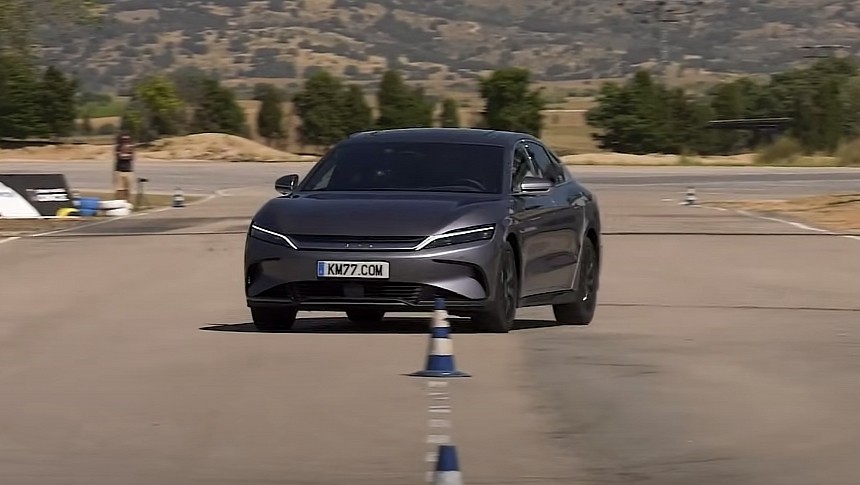BYD has sent the Han electric sedan to Europe to fight BMW i5 and Mercedes EQE. But does it live up to its mission? The infamous Moose Test that scares so many carmakers, obviously says no.
The BYD Han is the electric sedan priced at nearly 71,000 euros in Germany and 71,490 euros in the Netherlands. On the German market, main contenders like BMW i5 and Mercedes EQE are more affordable. The EQE starts at 67,187 euros ($71,640), while the i5 kicks off at 70,200 euros ($74,853).
Back at home, in China, it goes for only 229,800 RMB, which translates into approximately $32,000. The car is not available in the US, and apparently, the Americans have nothing to cry over. And it's not just the price that puts the Han sedan below the German contenders, but also handling and general road behavior.
Everything looks good on paper for the Chinese sedan. The car involved in the test is powered by a dual motor setup, which generates 510 horsepower (517 PS) and 516 lb-ft (700 Nm) of torque. Those are enough for a run from 0 to 62 mph (100 kph) in 3.9 seconds and a top speed of 112 mph (180 kph).
A lithium-ion battery pack with a capacity of 88 kWh stores enough energy for a 324-mile (521-kilometer) range on the WLTP testing cycle. Those are, at least as far as the theory goes, figures better than those of the German rivals. But does the BYD Han perform like the Germans when it comes to maneuverability?
Well, the km77 team doesn’t seem to think so, and they have a reason for it. They put the Han through the infamous Moose test, that tests the road behavior of the car in extreme steering conditions, but also through a slalom.
During the slalom, the test driver has issues with the throttle panel. He just doesn’t get the reaction that he expects from the car, calls the model “crazy” and "out of control," and refers to its driving style as being "outrageous." The Han eventually completes the run in 23.9 seconds. The Porsche Taycan GTS did 21.5 seconds.
Fitted with Michelin Pilot Sport 4S tires measuring 245/45 R19, the BYD Han has no chance to pass the Moose Test, carried out at 77 kph (48 mph). It understeers, takes out several cones, and has to resort to a 70 kph pass (43 mph).
Thus, that "sports sedan" tag that BYD sells the Han with is not exactly accurate. The Chinese carmaker might need to think again if they want to have a word in Europe in the electric sports sedans segment. And they might want to do some mods every here and there on the Han.
Back at home, in China, it goes for only 229,800 RMB, which translates into approximately $32,000. The car is not available in the US, and apparently, the Americans have nothing to cry over. And it's not just the price that puts the Han sedan below the German contenders, but also handling and general road behavior.
Everything looks good on paper for the Chinese sedan. The car involved in the test is powered by a dual motor setup, which generates 510 horsepower (517 PS) and 516 lb-ft (700 Nm) of torque. Those are enough for a run from 0 to 62 mph (100 kph) in 3.9 seconds and a top speed of 112 mph (180 kph).
A lithium-ion battery pack with a capacity of 88 kWh stores enough energy for a 324-mile (521-kilometer) range on the WLTP testing cycle. Those are, at least as far as the theory goes, figures better than those of the German rivals. But does the BYD Han perform like the Germans when it comes to maneuverability?
Well, the km77 team doesn’t seem to think so, and they have a reason for it. They put the Han through the infamous Moose test, that tests the road behavior of the car in extreme steering conditions, but also through a slalom.
During the slalom, the test driver has issues with the throttle panel. He just doesn’t get the reaction that he expects from the car, calls the model “crazy” and "out of control," and refers to its driving style as being "outrageous." The Han eventually completes the run in 23.9 seconds. The Porsche Taycan GTS did 21.5 seconds.
Fitted with Michelin Pilot Sport 4S tires measuring 245/45 R19, the BYD Han has no chance to pass the Moose Test, carried out at 77 kph (48 mph). It understeers, takes out several cones, and has to resort to a 70 kph pass (43 mph).
Thus, that "sports sedan" tag that BYD sells the Han with is not exactly accurate. The Chinese carmaker might need to think again if they want to have a word in Europe in the electric sports sedans segment. And they might want to do some mods every here and there on the Han.












